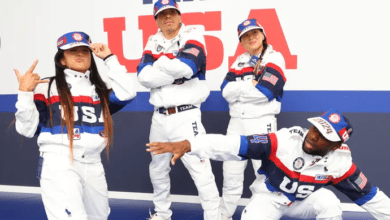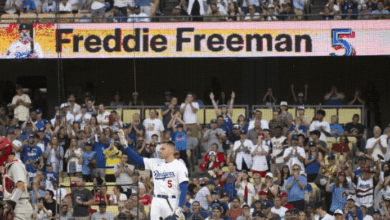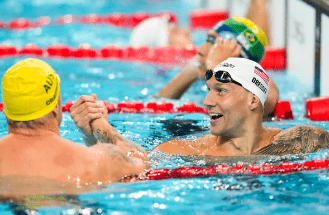The Irreplaceable Legacy of Jerry West: A Tribute to a Basketball Legend
Jerry West paased away ,I showed up for work at 9 am, browsed through my social media pages to check on my friends, and then started planning an early afternoon walk with my dog. At least that was my plan until my boss, Michael Fragale, entered the office to inform me that Jerry West had just passed away.
“Better get to work,” he said.
It felt like a basketball had just smashed through my front window.
As the person responsible for writing obituaries for our department, I often have materials prepared for notable figures in declining health. This was the case with Hot Rod Hundley and Sam Huff. However, Jerry West, a man who always exuded energy, vitality, and vigor, seemed almost immortal.
Remembering the Unmatched Jerry West
Where do you start with a man who achieved so much? What do you include and what do you leave out?
It’s impossible to capture all of Jerry West’s accomplishments from his 86 years in a short span. How can one encapsulate all he meant to the people of this great state and to those who cherished West Virginia University?
When you don’t know where to start, it’s best to begin at the beginning. For me, that beginning was a file cabinet filled with interviews I’ve kept over the years, including several conversations with West. My interviews with him amount to about a half-dozen transcribed phone calls, each spanning from roughly 20 minutes to a half hour.
A Generous and Gracious Interviewee
Some people offer you 10 or 15 minutes of their time before they want to move on to more important things. I’ve had people much lower down the pecking order do that to me. But not Jerry.
He was always willing to spend as much time as needed to answer any questions I had, especially regarding West Virginia, West Virginia University, and his Mountaineer basketball teammates. I quickly realized the easiest way to get interesting responses from Jerry was to ask about his dear friend Willie Akers or his fellow classmates.
The Golden Era of West Virginia Basketball
West Virginia fans placed gold and blue flowers on Jerry West’s statue following his death in Los Angeles Wednesday morning (WVU Photo/Jennifer Shephard).
I remember once asking him why there were so many outstanding basketball players in the state in the mid-1950s when he was playing at East Bank High. I repeated a story the late Eddie Barrett had told me about Virginia Tech coach Chuck Noe, who saw the high school game scores in Virginia being in the 40s and 50s, then looked at West Virginia scores being in the 80s and 90s, and decided he wanted those West Virginia players.
Dan Hurley Chooses UConn Over Lakers: Aiming for Third Straight NCAA Title
That naturally got Jerry talking.
“We played the Kentucky all-star team, and they were supposed to have the best players in America,” he recalled. “Well, as it turned out, we had the better players. We played them twice and beat them twice. It was just a very high-caliber group of guys that we had in West Virginia at that time.
“Style of play was a big part of it,” West explained. “I think coaches were a little bit restrictive than some coaches in certain areas. Most coaches probably inherit their coaching philosophy from coaches they played for. When I was being recruited for college, Maryland played a very slowed-down game, and I kind of liked that school a little bit, but I just couldn’t go there and play that way. It just didn’t look like it would have been fun for me to play like that.”
At the time, West Virginia coach Fred Schaus had recently retired from the professional ranks. With first-time assistant coach George King, they were still young and athletic enough to get out on the floor and give the guys some pointers and tricks most other coaches couldn’t.
King played on an NBA championship team with the Syracuse Nationals, and West recalled going up against him many times in the old Field House.
“Maybe where I developed a little bit of confidence was because George King was there, and I used to play against him,” he noted. “He was very experienced and very smart, and I found out that I could play against him okay, and that it wasn’t going to be embarrassing for me.
“It was a great environment for any of us who wanted to learn, and more importantly, to engage with two people who had played basketball at a different level than any of us had ever played.”
Team Building and Leadership
Team building was the secret to Schaus’ and King’s successes in coaching, something Jerry clearly learned during his career.
The great things West accomplished later with the Los Angeles Lakers, Memphis Grizzlies, Golden State Warriors, and Los Angeles Clippers as an executive had their roots in those well-rounded West Virginia basketball teams of the late 1950s.
Schaus convinced Akers that he was better off being a supporting player to Jerry West at West Virginia University than being the leading scorer at Virginia Tech or Wake Forest, where some of the other top players in the state were going.
Willie had one simple desire when he chose to sign at WVU and play basketball with his buddy Jerry West.
“I wanted to win,” he said.
So, he came to WVU and teamed with Lloyd Sharrar, Bobby Joe Smith, and Jim Ritchie to grab rebounds and play defense while guards Joedy Gardner, Don Vincent, Bucky Bolyard, Ronnie Retton, and Lee Patrone handled the basketball. It was Jerry who made the tough shots and rose to the occasion whenever it was required.
Every single player on the team would knock over their grandfather to get a loose basketball, that’s how driven they were.
“We were very, very competitive kids,” West recalled. “Just because some of them were fun-loving doesn’t mean they weren’t competitive. They were great people and for someone as quiet and shy and backward as me, it made for a completely different situation in terms of kind of getting out of my shell and making me laugh a little bit because I wasn’t going to change my demeanor. I was much more serious.”
A Serious and Focused Professional
I witnessed that Jerry West seriousness first-hand when I was once asked to be a part of a speaking program that included West in Lewisburg, West Virginia.
Jerry was promoting his new book and I had just written “Roll Out the Carpet,” so the idea was for me to go on beforehand and warm up the crowd for a half hour before West took the stage.
After telling some funny Hot Rod Hundley, Wil Robinson, and Levi Phillips stories, it was time for me to exit and head back to the Green Room. It was there where I crossed paths with West, shook his hand, and said hello in a somewhat flippant manner.
He looked at me, shook my hand, and nodded, but his attention was already on the task at hand. He had the focus of a prizefighter about to enter the arena, partly because his book was so personal and revealing and he was about to answer some very uncomfortable questions. It was then I realized that there are common human beings and there are elite human beings.
Jerry West was an elite human being. He was the one person we West Virginians aspired to be, and he understood the heavy responsibilities that entailed.
A Legacy Worth Studying
For everyone out there in the Mountain State (and beyond) reading this, do yourself a favor and study Jerry West’s life. Study how he treated others with empathy, dignity, and respect. Study how he always honored his commitments and conducted himself professionally.
The blueprint to a successful life is contained within Jerry West’s personal story – the successes, the failures, the good times, and the heartaches, all wrapped up into one.
He epitomized all the values we West Virginians hold dear to our hearts, which is why it’s so difficult for us to say goodbye.
In the meantime, lower your West Virginia flags until after West Virginia Day on June 20th in honor of West’s memory because there will never be another Jerry West – ever.



